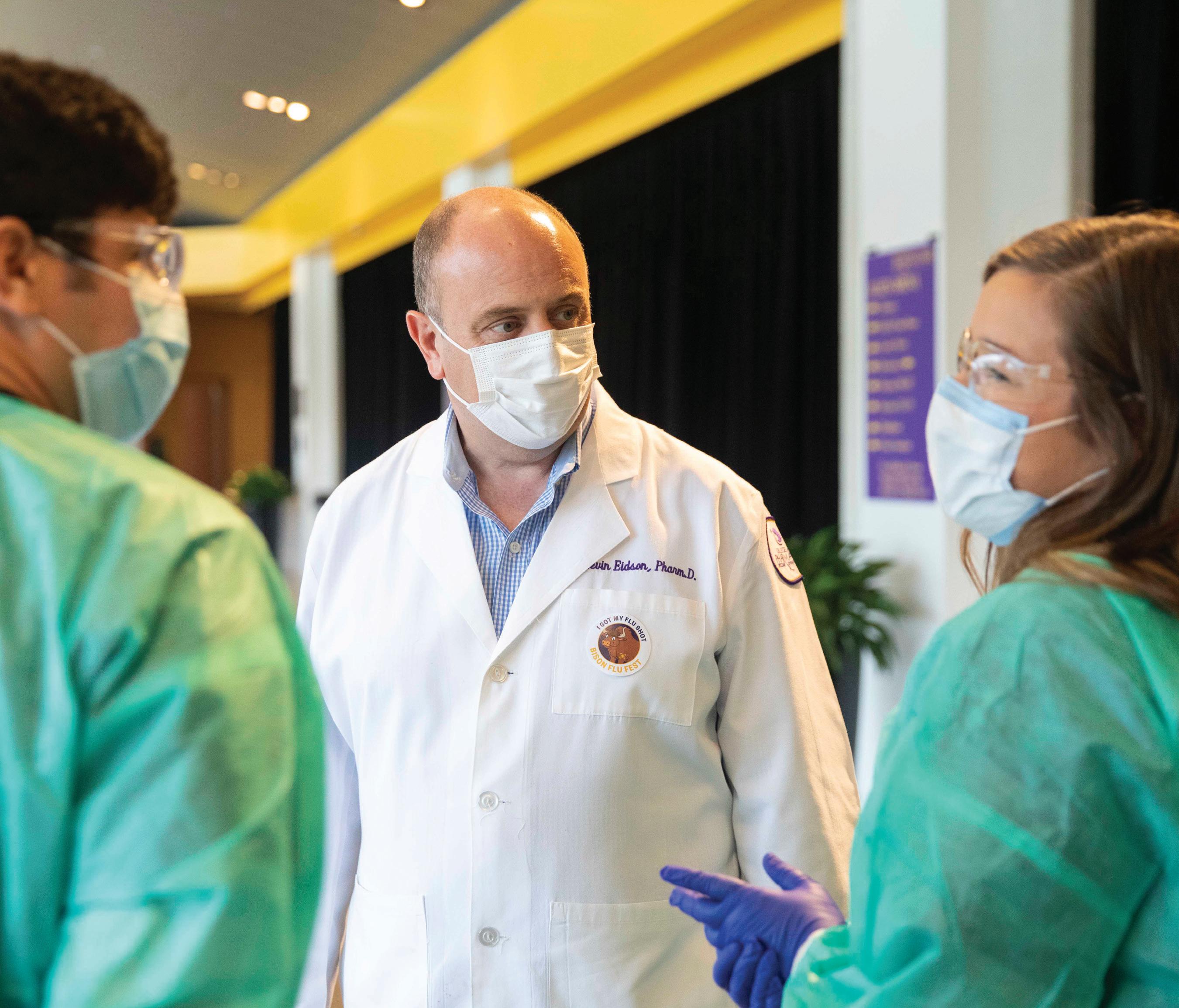
9 minute read
The pandemic descended upon us
Lipscomb alumni across the nation stepped up to the challenge
From health care to education, from donations of money to donations of time and expertise, from one-on-one caring to marshalling the resources of an entire business, the Bisons brought the Lipscomb spirit of innovation and service to their neighbors in 2020.
Advertisement
BRINGING MORE HOPE THAN FEAR
Dr. James Parnell (’06), attending physician at the emergency room at Sumner Regional Medical Center in Gallatin, Tennessee, now works in a world where patients can no longer see the face of the doctor caring for them. A world where one of the most important duties of a nurse is to hold the hand of a dying patient. A world where providing hope, in the face of rising fear, is a crucial management goal. “It’s a scary time to live in this paradox, and I ask myself, ‘How do I help?’ God has blessed me with skills and ability to care for patients, so I have great peace in that. I have to trust that He has me where he wants me to be.
“As the leader of the team, I look in the faces of the nurses and technicians, and there is a lot of fear and anxiety I see on those faces. My goal is to have more hope than fear, to block out the COVID noise and show that Jesus is around us all the time.”

Dr. James Parnell ('06)
CARING FOR EMOTIONAL AS WELL AS PHYSICAL NEEDS
Often these days, nurses find themselves taking care of emotional needs just as much as physical needs. Megan Turnington (LA ’06), began an Amazon wish list where the public could buy COVID patients in Nashville’s TriStar Centennial Medical Center items they can use to make the days a little brighter, such as cell phone chargers, coloring books, word searches or puzzle books.
The list started as a way to meet the needs of the health care workers, but quickly turned into a mechanism to fight the loneliness and discomfort of COVID patients, who are not allowed visitors. “That has really taken off and has been really cool to see,” said Kaleigh Sabin (’18, LA ’14), a charge nurse in the COVID ward for TriStar Centennial Medical Center.

Kaleigh Sabin ('18) and Ashlee Taylor ('18)
ENTERING PANDEMIC CARE SYSTEM INSTILLS RESOLVE, NOT FEAR IN NURSING GRADUATE
As a high school senior and aspiring nurse in Proctorville, Ohio, Abbey Ward (’20) certainly didn’t foresee that by the time she completed her training, the world would be dealing with a pandemic. Now her dream job in the Vanderbilt University Medical Center emergency department, which she secured before she even graduated, comes not only with excitement, but a good deal of uncertainty.
“For me, nothing has changed, this is exactly what I want to be doing. In my preceptorship (at Vanderbilt), I was excited to go into work every day. I know this is exactly what I was made to do. (The emergence of the pandemic) actually makes me more excited, because I know how much of a difference I will be making and how people are relying on us.”
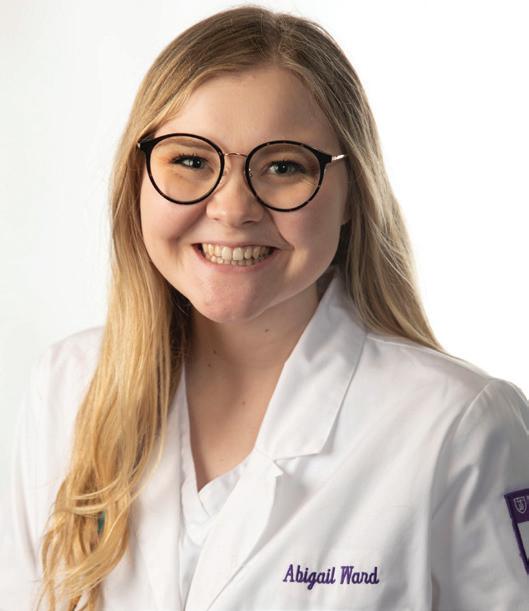
Abbey Ward ('20)
FREEDOM COMPANY EMPOWERS THE PUBLIC TO DONATE MASKS
From its beginning, Adam Suttle’s (’17) business, Freedom Company, was about doing good. It’s tagline even spells it out: Wear Great, Do Good™. So it’s no surprise that when the world went into crisis mode, he shifted his business to address the crucial need for face masks.
As an apparel company that works closely with American companies to make small-batch runs of premium cotton T-shirts, sweatshirts and hoodies, Freedom Company, based in Nashville, was well-positioned to begin making washable, non-medical cotton masks for the community.
When customers purchase Freedom Company apparel, they are empowered to choose where to donate a portion of the sale: to provide clean water around the world, job training in Uganda or to fight human trafficking.
Using the same model and setting aside its apparel production for a time, Suttle empowered customers to do good themselves by purchasing the cotton masks and donating them either to health care workers in Tennessee or to deliver the masks themselves to the site of their choice.

Adam Suttle ('17)
SPECIAL EFFECTS COMPANY GRABS CHANCE TO HELP FILL SHORTAGES
Who ever thought that fake fog could become a hero?
That is exactly what Lipscomb alumnus Chris Markgraf is making happen at his plant in Columbia, Tennessee. Froggy’s Fog, which produces the chemicals needed to create fog used in theatrical special effects, has switched over to produce hand sanitizer.
As Markgraf watched the supplies of hand sanitizer fly off store shelves, he came up with the idea to use some of the same chemicals he uses in the fog to make hand sanitizer. Froggy’s Fog paused production on its fog products and now produces an 80% alcohol formula for hand sanitizer that can be used in medical facilities and by first responders, as well as the public.
On its first weekend of public sales in March, the company set up a distribution station in its parking lot in Columbia and sold jugs to the public, providing a free gallon jug to any first responders who came by that day, Markgraf said.
“We care. We try to take care of people,” said Markgraf, whose company counts many firefighting and military units among its fog customers.
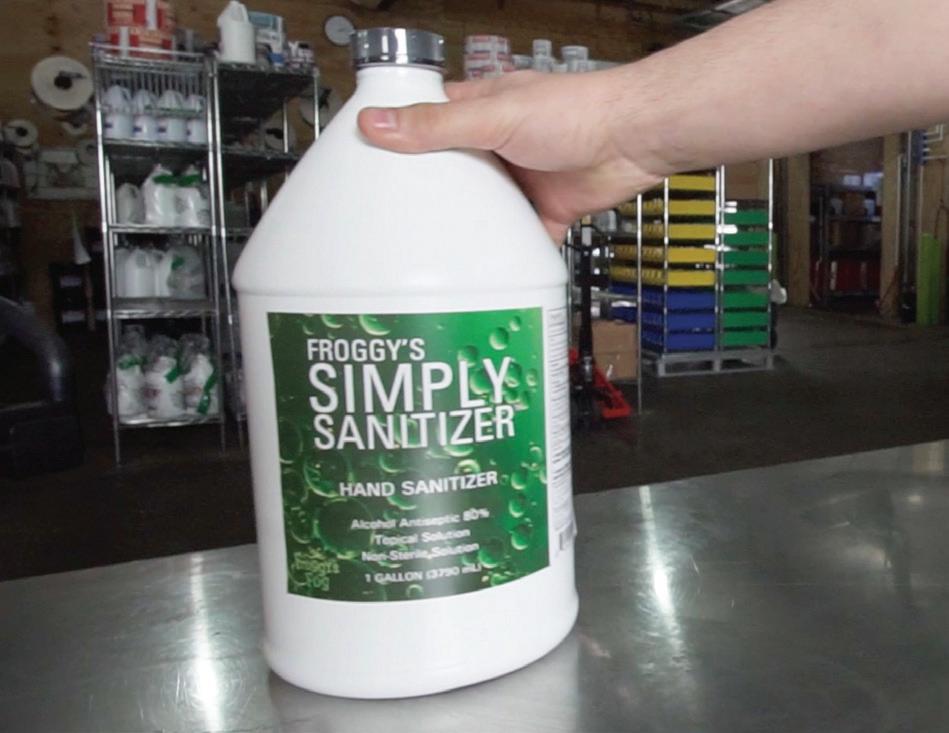
CREATIVE TEACHING BRINGS HEART TO REMOTE LEARNING
During the spring lockdown, when most of Tennessee’s schools were closed, Wilson County’s West Elementary School Principal Christopher Plummer, a doctoral student in the College of Education, made a point to visit his students in his teachers’ various Zoom classrooms, giving them virtual high fives and hugs just as he does in the school hallway greeting them in the mornings, he said.
He also held several bedtime story read-alongs on the school’s read-along Facebook site, dubbed “West Side Story” during the spring semester. Several teachers also began reading to students through the site.
One evening, however, he forgot about the scheduled bedtime story until the last moment, when he found himself still at a local Cracker Barrel restaurant. Undaunted, he bought a book at the Cracker Barrel store, sat down in one of the rockers outside, and recruited a Wilson County teen to video him reading the book to his students.
From “lunch bunch” gatherings, to virtual scavenger hunts and talent shows, Plummer and his teachers kept Wilson County students engaged and feeling part of the school community despite the shutdowns.
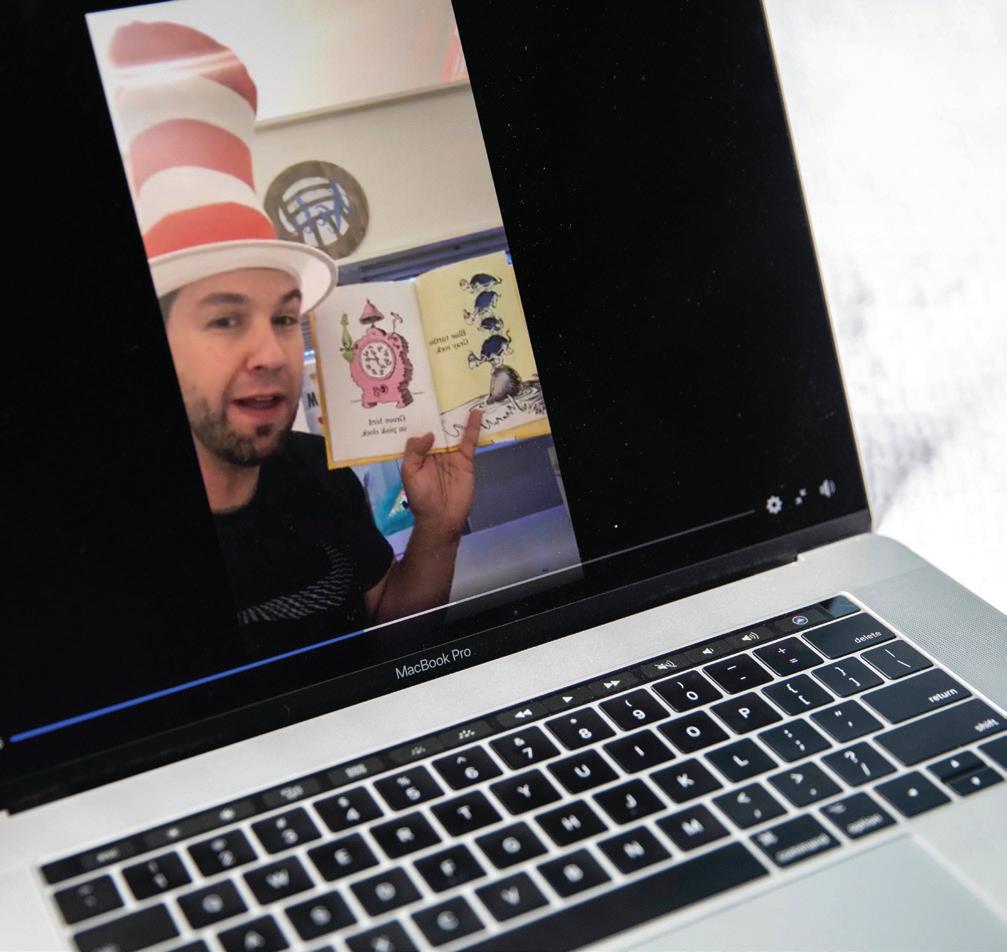
Christopher Plummer (doctoral student)
LETTERS PROJECT BOOSTS STUDENTS’ SKILLS AND WORKERS’ SPIRITS
Kathryn Roach, a May 2020 graduate of Lipscomb’s post-baccalaureate certification for English as a second language, found a unique way for her 19 third-graders to “use their voices for positive change” while homebound during the spring semester.
As many of her students did not have a computer, Roach and a classmate at Lipscomb devised a project for the Glengarry Elementary School students in Nashville to handwrite letters of encouragement to essential workers who were still on the job this past spring.
The project boosted their writing skills, required them to think about tips for staying positive and raised the spirits of workers at Kroger, Walmart, Walgreens, TriStar medical centers, Vanderbilt children’s hospital and the public school system’s food distribution site.
One of the letters was even selected to appear in the public school system’s employee newsletter as the inspiration of the week.
ALUMNUS’ FOUNDATION DONATES 10,000 LIPSCOMB STRONG FACE MASKS
In June, after the state had opened up to commerce, Mark Ezell (’82), commissioner of the Department of Tourist Development and director of the Economic Recovery Group established by Gov. Bill Lee, spearheaded the Ezell Foundation’s purchase of 10,000 cloth masks for Lipscomb as part of the Tennessee Strong Mask Movement. The Mask Movement was an ERG partnership with more than 30 flagship brands to distribute close to 300,000 free or low-cost cloth face coverings across the state.
The goal was to keep Tennesseans safe while showing their support for local brands from the worlds of sports, education and business. Lipscomb made the Lipscomb Strong masks available to all employees and students.

ALUMNA OPTS TO CARE RATHER THAN CREATE DURING ECONOMIC DOWNTURN
Finding herself out of a job shortly after the pandemic started, Rachel Stewart (’19) returned home and began work in long-term care rather than in her chosen field. Her positive, heartfelt LinkedIn post in July about what she is learning from the experience has garnered more than 1 million views and more than 1,000 comments.
“I had to move back to Canada and was out of a job back in March, due to COVID-19. No one was hiring graphic designers. So I took this job, not in my field, in the midst of a global pandemic so I could hug my grandma (I’m the only person in my family that can do that right now). I took this job to help instead of just sitting at home feeling bad for my displaced, unemployed self. I am not just a graphic designer. I’m a human being who loves to create but also to care for others.”
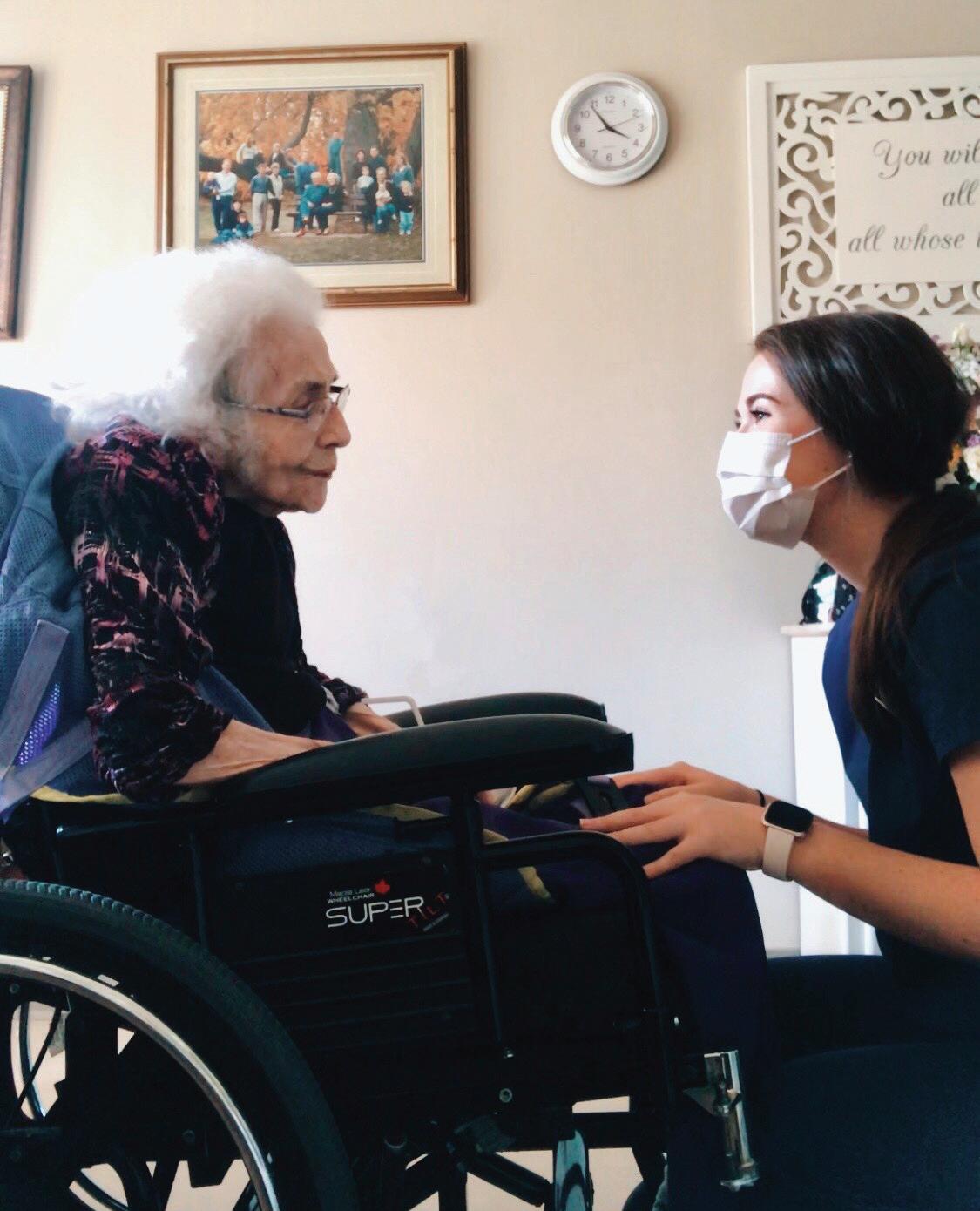
Rachel Stewart ('19) and her grandmother
YALE GRAD BECOMES LISTENING EAR FOR PATIENTS AND FAMILIES
Kayla Ford (’17), a 2020 graduate of Yale Divinity School, is working as a chaplain at Brooklyn Methodist Hospital in New York City, the U.S. city most hard hit by COVID-19 this past spring.
“A lot of work in chaplaincy is listening to people’s stories and helping them to find meaning in their suffering. People want to be heard and seen. They want to honor the suffering they are going through, so they just want to talk about it because sometimes the burden is too much to carry alone. I know that I am doing important and meaningful work. I am happy to do it, because I know it is really needed.”
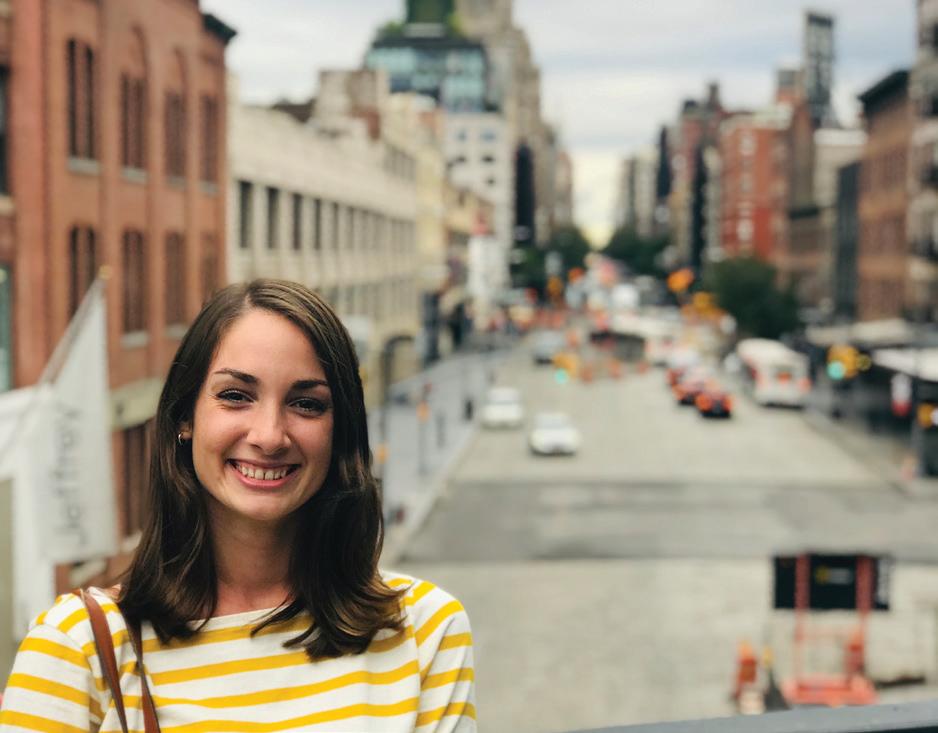
Kayla Ford ('17)
COUNSELING STUDENTS CREATE BLOG TO FIGHT ISOLATION
As quarantines around the world placed millions in greater isolation, concerns about rampant depression, loneliness, suicidal thoughts and other mental health issues set in.
Students Audrey Jean Jones, Jennifer Knowles and Christina Rumbaugh, all pursuing their Master of Science in clinical mental health counseling, were assigned the task of developing an advocacy project for their Introduction to Mental Health Counseling course. As the local lockdown continued, they realized how important it was to talk about isolation and to be aware of its impact.
In response, they developed advocacyforisolated.org, a website that covers topics including mental health, COVID-related issues, good news, public resources and ideas for increased wellbeing for all people but especially those affected by isolation.
SOFTWARE ENGINEER DEVELOPS OPEN SOURCE TOOL TO AID VACCINE RESEARCHERS
While the world feverishly worked to develop a COVID-19 vaccination, Thomas Townsley (MS ’19) made his contribution by helping to develop PantographTM, a visual browser for Graph Genomes, a new way of capturing gene sequence data to aid researchers in studying the sequence diversity of the virus, which helps in successfully developing a vaccine.
Townsley worked with a group of scientists and researchers from around the world beginning in March to build the pangenomic tool, which debuted in July to aid vaccine research. The software is free and open source. The research team hopes to “get it into the hands of as many researchers as possible” to expedite the development of a COVID-19 vaccination, Townsley said.
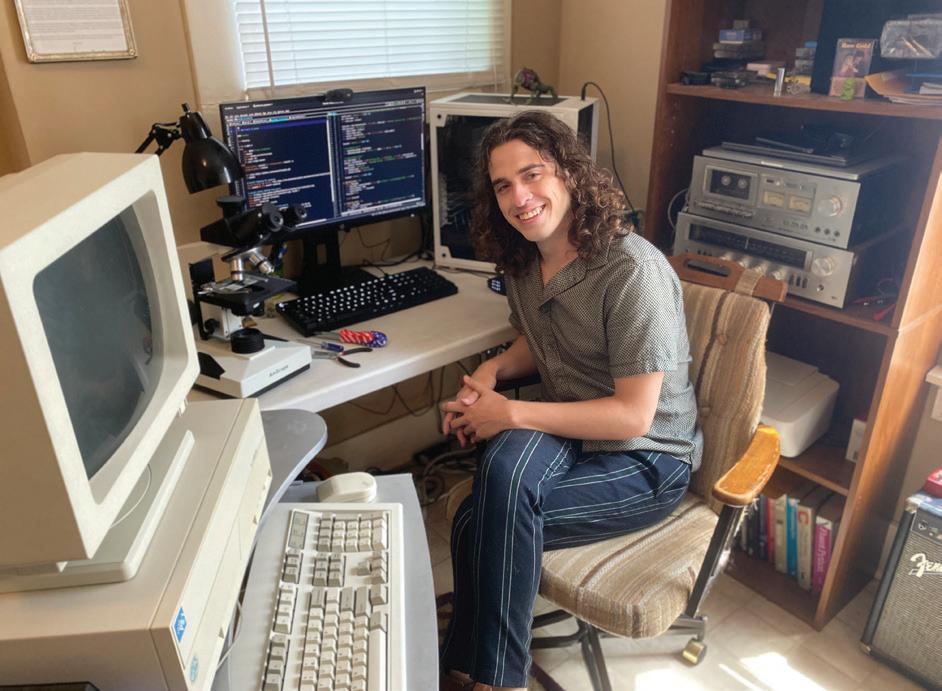
Thomas Townsley (MS '19)

